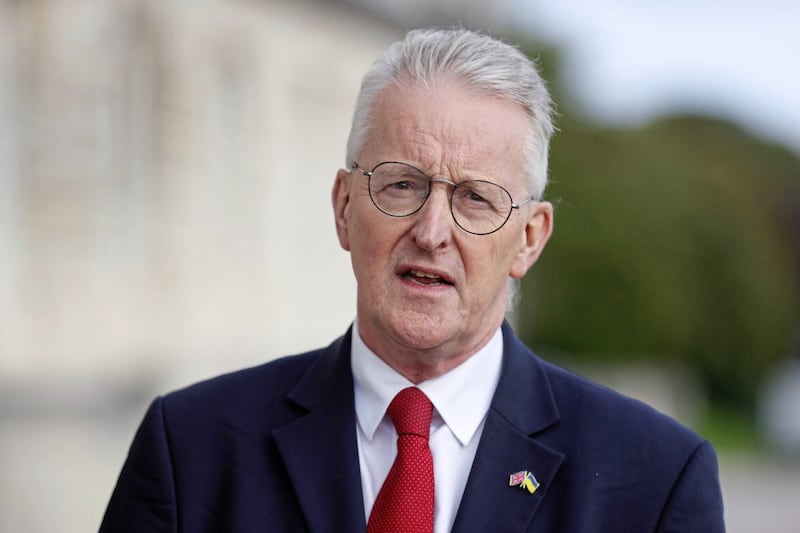Suppose the Good Friday Agreement had specified the conditions for calling a border poll. A majority of nationalist seats at Stormont used to be a commonly-heard suggestion. Under this condition, nationalism would be no nearer its goal today than after the first assembly election in 1998, when it took 39 per cent of seats, exactly the same percentage it won last year.
There is no doubt nationalism has advanced politically over the past two decades. It has failed to advance numerically because of the rise of Alliance, a phenomenon that appears to have stalled but at a higher new long-term level.
Had the nationalist majority condition been in place, either a border poll would now be seen as indefinitely deferred or the Alliance surge would have been curtailed by voters treating every election almost literally as a border poll. The framers of the Agreement clearly wished to avoid this and it is still generally considered a blessing that nationalism and unionism must woo the centre ground to succeed.
In theory, the centre ground could be protected by forgetting about a nationalist majority and simply requiring more nationalist than unionist seats. In practice, this would still polarise the electorate, turning the Alliance surge into a squeeze.
Nationalism might even have beaten unionism under these terms last year - it is only two seats behind. Yet few nationalists seriously want a poll this decade as opinion polls suggest they could lose by up to 20 points, putting their next chance back by a generation.
If opinion polls were given a formal role in the decision it would be handing extraordinary responsibility to a private industry that by its own admission is too small in Northern Ireland to ever sustain a dependable ‘poll of polls’
Setting the condition of more nationalist than unionist first preference votes would raise a technical problem. Because assembly assembly members do not designate until after they are elected, they could game the system or claim voters lacked decisive information. In addition, votes for unelected candidates would not count, even if their intended designation was obvious.
Imagine if one People Before Profit MLA could trigger a border poll by designating as nationalist rather than other - a situation only a couple of seats or percentage points away from last year’s outcome. Consider the pressure they would be under and the contention arising from their choice. If they triggered a poll, it would have no winners: nationalism would lose, perhaps disastrously, while unionism and ‘others’ would still resent the exercise as illegitimate.
If opinion polls were given a formal role in the decision it would be handing extraordinary responsibility to a private industry that by its own admission is too small in Northern Ireland to ever sustain a dependable ‘poll of polls’. The move from face-to-face and telephone surveys to online methods would raise fears of manipulation, while any government-run or subsidised polling would raise fears of political manipulation.

In short, there is no way to specify conditions that would not have unintended and potentially perverse consequences, many of them operating through feedback effects as voters and politicians tried to ‘work to the test’.
This is why the Good Friday Agreement left the decision up to the secretary of state, based only on his or her judgment of a “likely” nationalist victory - what might be called the ‘you’ll know when you see it’ test.
- Eastwood sounding like a Drumcree Orangeman over Bloody Sunday walkOpens in new window
- The real Stormont deadline will be decided by the date of the next general electionOpens in new window
- A 15% rise in regional rate bills? Building a fairer system would make revenue-raising easier - Newton EmersonOpens in new window
It is why the High Court and the Court of Appeal upheld the wisdom of the Agreement, in challenges brought three and six years ago by victims campaigner Raymond McCord, finding conditions had been deliberately omitted to allow for “political judgment” and “the constitutional value of flexibility.”
Nothing prevents any incumbent at the Northern Ireland Office from explaining their own conditions, as promised by Peter Kyle, Labour’s last shadow secretary of state. However, this would be setting precedents and creating hostages to fortune with the same problems as formal criteria, while lacking the legal basis and consensus of being in the Agreement.
Hilary Benn, Kyle’s successor, revealed to the Irish News this month he will not be explaining his conditions. He said he had reached this conclusion after reading the Agreement and the McCord judgments. In the wake of those judgments, demanding official conditions for a border poll suggests either a lack of understanding or a tendency for mischief. It is good that our likely next secretary of state is prepared, diplomatically, to say so.










